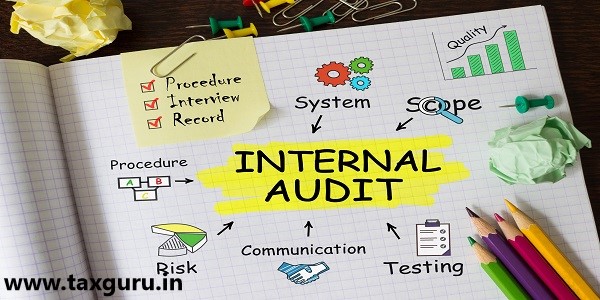Dear readers, in the era of this competitive market, the key to success and to stay live in market is to provide best customer service/product at reasonable price. To achieve this success mantra, internal audit of organization can play a vital role. In laymen language Audit means verification/ authentication of our records, processes, goals etc with predefined standards/rule and regulation. Internal audit means audit of organization by 3rd person on behalf of management of the organization, so that true position of organization can be presented before the owners/ stakeholders.
The success of internal audit depends on the person/professional who has been hired to conduct the internal audit, his knowledge/ awareness about the rules and regulation of the Industry and its experience in such kind of audits. If audit is conducted with adequate care, then internal audit has the power to save organization from statutory defaults along with this increase the profits of organization many times. Internal audit is a vide area which can be extended to many departments of the organization like Production, HR, Sales, Accounts and marketing department. Out of this big area, in this article, we will discuss about some points that helps management to increase their business and profits.

1. Analysis of Industry and Competitors
As we all know, to run any business, we require customers. In this point, customer sentiment is analyzed from Industry and competitors point of view. Here SWOT Analysis of organization as well as Industry is done, so that future impact of any big investment can be anticipated.
2. Production/ Services Cost Analysis
Before deciding sale price of our product/service, we must know, what is our exact cost to produce/render that product/service? Many organization fails at this point. MSME Sector entrepreneurs’, who are new in market, fails due to this error. To give competitive rate to customers they ignore this point and at last they have to shut down their business and have to lose their hard earned money. In internal audit, this point takes maximum time because when we do not know the cost, how can we decide the Sale price.
3. Product Quality/ Service Check
In this point, surprise verification of Product Quality/ Service is done, so that customer experience can be acquired and all short coming can be found. By this check customer support service and employees commitment level can also be checked.
4. Audit of Accounts and Analysis of Cash flow statements
In this part, detailed analysis of accounts is done, so that accuracy of accounts can be verified and whether statutory compliances are done on regular basis or not. Sometimes, it is observed that, due to non compliances of law, penal provisions are so harsh that, they can affect the survival of business. In this part cash flow statements is verified, and organization liquidity and its liability payment capacity is analyzed.
5. Marketing Audit
We all know that, marketing is an integral part of business activity. By marketing, we approach new customers to associate with us. In this part, it is analyzed that, whether our marketing strategy is right or not, what is our marketing cost and revenue generated through these activities. Whether organization is able to target the right audience of their product?
6. Human Resource Audit
Employees of an organization are like a backbone. If an organization is able to recruit right employee at right price, then its speed of growth is unexpected. Here, it is verified whether there is any SOP that must be followed before recruiting the new employee, how the performance of employee will be rated to know whether that employee is asset or liability for the organization.
In my point of view, every MSME enterprise must conduct internal audit on regular basis, so that actual position of organization can be seen and if required then remedial actions must be taken in time to survive in this competitive market.
****
Disclaimer: This article is for the purpose of information and shall not be treated as solicitation in any manner and for any other purpose whatsoever. It shall not be used as legal opinion and not to be used for rendering any professional advice. This article is written on the basis of author’s personal experience. Adequate attention has been given to avoid any clerical/arithmetical error, however; if it still persist kindly intimate us to avoid such error for the benefits of others readers.
About the Author: The Author “CA. Shiv Kumar Sharma” can be reached at mail – shivsharma786@gmail.com and Mobile/Whatsapp – 9911303737/ 9716118384





